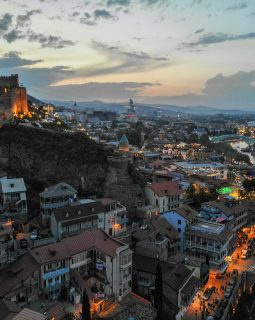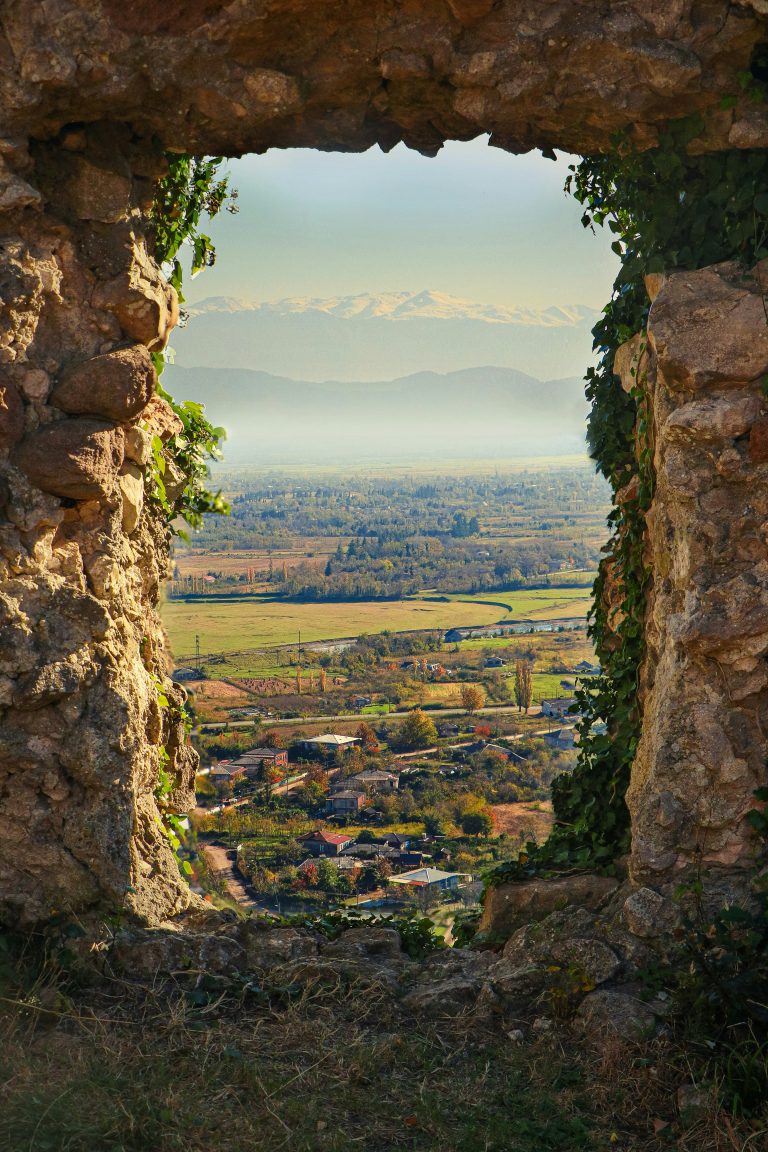Currently Empty: $0.00
About Georgia
Georgia is a country that lies at the crossroads of Europe and Asia, in the Caucasus region. It has a rich and diverse history, culture, and natural beauty. Georgia is known for its ancient winemaking traditon, its stunning mountain scenery, and its hospitable people. Georgia has a coastline on the Black Sea, where subtropical resorts and historic cities atract visitors. It also has a rugged interior, where the Greater and Lesser Caucasus mountains offer opportunities for hiking, skiing, and exploring.
Georgia has a variety of ethnic groups, languages, and religions, reflecting its location at the junction of different civilizations. The majority of Georgians are Orthodox Christians, but there are also Muslim, Jewish, and other minorities.
Georgia’s capital and largest city is Tbilisi, a vibrant and cosmopolitan metropolis that blends old and new. Georgia is a parliamentary republic, with a president and a prime minister. It has faced many challenges in its recent history, such as the collapse of the Soviet Union, the conflicts in Abkhazia an South Ossetia, and the 2008 war with Russia. Despite these difficulties, Georgia has maintained its sovereignty and identity, and has pursued closer ties with the European Union and NATO. Georgia is a country that offers a unique and unforgettable experience for travelers, who can discover its beauty, diversity, and charm.














Location
Southwestern Asia, bordering the Black Sea, between Turkey and Russia, with a sliver of land north of the Caucasus extending into Europe; note - Georgia views itself as part of Europe; geopolitically, it can be classified as falling within Europe, the Middle East, or both. Georgia (or Sakartvelo, which meaning Land of the Kartvelians) is a country of ancient culture situated in the Caucasus region bordering Russia, Turkey, Armenia and Azerbaijan. The country is composed of 10 districts plus 2 considered (not by Georgia) autonomous republics (Abkhazia and Samachablo / South Ossetia). By the way, don’t tell a Georgian these regions are independent countries.
ETYMOLOGY: The name in Georgian means "warm place," referring to the numerous sulfuric hot springs in the area.
INDEPENDENCE: 9 April 1991 (from the Soviet Union); notable earlier date: A.D. 1008 (Georgia unified under King BAGRAT III)
NATIONAL HOLIDAY: Independence Day, 26 May (1918); note - 26 May 1918 was the date of independence from Soviet Russia, 9 April 1991 was the date of independence from the Soviet Union.
GOVERNMENT TYPE: Semi-Presidential Republic
CAPITAL: Tbilisi
GEOGRAPHIC COORDINATES: 42 00 N, 43 30 E
MAP REFERENCES: Asia
AREA: Total: 69,700 sq km, Land: 69,700 sq km, Water: 0 sq km
CLIMATE: Warm and pleasant; Mediterranean-like on Black Sea coast.
POPULATION DISTRIBUTION: Setlement concentrated in the central valley, particularly in the capital city of Tbilisi in the east; smaller urban agglomerations dot the Black Sea coast, with Bat'umi being the largest.
Language
Georgian is the idiom spoken in Georgia, a unique language of a single alphabet. It is one of the 10 oldest languages still spoken in the world and part of the Kartvelian languages, a group of languages practically spoken only within and around Georgia. The Georgian language is not particularly simple and can be very difficult to learn, especially if your idea is to speak it correctly. Words are formed through prefixes and suffixes that indicate the meaning of words. For example, the name of the country in Georgian, Sakartvelo (საქართველო) means “where the Kartvelians live”, with the prefix “sa” and “o” being added to the radical “kartvel” which make up the meaning of the word.
You do not necessarily have to speak Georgian to live in Georgia, especially if you want to live in the larger cities like Tbilisi, Kutaisi and Batumi. In most essential services it is always possible to find someone who speaks basic to advanced English. In the remaining of the situations Google Translate and the good will of the Georgian people always surpass the language barrier







Living in Georgia
Georgia is full of rich heritage atractions and ancient cultural sites. The cost of living in Georgia is extremely cheap compared to some other countries around the world. Accommodation and food are cheap and does not put a strain on your budget. Georgia is also home to one of the most unique cuisines in the world. The country was once a major route on the Silk Road, resulting in a number of spices, smells, and flavors passing through the nation.
The cuisine is deeply influenced by both European and Asian cuisines, and its history in the Soviet Union has also brought some hearty meals to the local food scene. Tap water in Georgia is totally safe to drink. The Caucasus mountains provide fresh, clean water that feeds into the local supply public transport seems a litle tired in Georgia but it’s still a prety efficient way to get around. Buses also operate across the country, but keep in mind that destinations are often displayed in Georgian so you’ll need to check a
translation.
Living Costs to Study Medicine in Georgia:
Living Costs to Study Medicine in Georgia:
| Expense | Monthly Cost ($) |
|---|---|
| Accommodation | 300 |
| Food | 90 |
| Electricity | 30 |
| Water | 3 |
| Transportation | 9 |
| Cable TV/Internet | 10 |
Culture
Georgians are known for their warrior spirit, hospitality, love of life, and lively intelligence. Their sense of humor and reputed longevity contribute to the vibrant cultural fabric of Georgia. Georgia’s culture is a captivating blend of ancient traditions, religious art, and a resilient spirit that continues to thrive.
Georgians, initially reserved, reveal their warmth and friendliness once familiarity blossoms. A cherished tradition is the Supra, a communal feast shared among friends and family within Georgian homes. If you receive an invitation to one, consider yourself deeply honored. Georgia boasts an ancient and distinctive cultural heritage, renowned for its hospitality and culinary delights. As a guest in a Georgian household, you hold a status akin to royalty, with food and drink generously offered at frequent intervals










Weather
Georgia has a warm, temperate climate with pleasant weather that will definitely improve students’ mood, memory and broadening cognitive style like openness to new information and creative thoughts. Georgia enjoys a varied climate, which is mostly sub-tropical. The summers are hot and humid, and winters are mildly cold. While the northern mountain peaks are permanently snowbound, the west coastal areas by the Black Sea enjoy a year-round balmy weather.
The average temperature in the east in summer ranges between 60°F to 75°F (20°C – 24°C) and in winter ranges between 36°F to 39°F (2°C – 4°C). Specifically, Western Georgia experiences a sub-tropical, maritime climate and in summer the average temperature is 72°F (22°C), dropping to 41°F (5°C) in winter
Cost of Health Care
Medical costs are fairly affordable in Georgia. You can opt for an international plan which will cost you the same as similar plans in Europe and North America.
VISAS:
Georgia, once lenient in allowing work under tourist visas, has recently tightened regulations. To engage in employment within the country, you now require a work permit. Fortunately, obtaining these permits is relatively straight forward, especially when compared to similar visas in other nations, even within the Caucasus region. The key requirement for a work visa in Georgia is an employment offer from a local organization. Importantly, this organization need not be Georgian; many international agencies operate within the country. As an expatriate, your best bet is securing an employment offer from one of these agencies, as they are more likely to conduct business in English. Additionally, it’s worth nothing that while working on a student visa is possible, such visas are not very common.
BANKING:
Opening a bank account in Georgia is indeed straight forward. Here’s what you need to know:
• Visit a Bank: Walk into a bank in Georgia
• Proof of Address: Bring along proof of address (which can be from your home country)
• Funds: Have some funds ready to transfer into the account
No local address is required, making it convenient for expatriates. Georgia’s banking system is accessible and expat-friendly, allowing you to manage your finances with ease.










Transportation
Georgia, strategically positioned at the crossroads of Europe and Central Asia, serves as a natural transport conduit bridging the West and the East. For students, this translates into flexible travel options aligned with their preferences. Let’s delve into the key aspects of Georgia’s transportation infrastructure:
Airports:
• Shota Rustaveli Tbilisi International Airport: A major gateway, connecting Georgia to
global designations.
• Aleksandre Kartveli Batumi International Airport: Vital for travelers seeking coastal
access.
• David the Builder Kutaisi International Airport: A hub for Wizz Air, offering affordable
connections to Western Europe and the United Arab Emirates.
Seaports:
• Batumi, Poti, Kulevi, and Supsa are operational seaports.
• Anaklia is currently under construction.
• The trans-Black Sea route links Georgia and Bulgaria, facilitating maritime trade.
Affordability:
• Transport costs in Georgia are student-friendly.
• From snow-covered fields accessible via low-cost, comfortable trains to exploring
• local villages in marshrutka transport vans, students can enjoy world-class amenities
without breaking the bank.
In summary, Georgia’s well-connected infrastructure empowers international students to explore both Georgian and European atractions while adhering to their preferred transport budget
Safety & Security
The local government in Georgia is commited to safeguarding its citizens and institutions within the country’s borders, a commitment recognized by the global community. Guided by international laws and principles, Georgia acknowledges that safety is interconnected both among its citizens and within the broader international system. The safety of one state cannot come at the expense of another state’s security.
Universities play a crucial role in maintaining a secure environment for health, life, and property. Within university campuses and their surrounding areas, legislated actions are implemented by law enforcement agencies to ensure safety. Additionally, security guards and CCTV cameras protect every
university campus, creating a secure environment for students










 About Us
About Us Our Consultants
Our Consultants Acceptance Letters
Acceptance Letters Testimonials
Testimonials Why Choose Us?
Why Choose Us? Contract (Agency/Student)
Contract (Agency/Student)  MOU (Agency/Agency)
MOU (Agency/Agency)  eBOOK
eBOOK 

